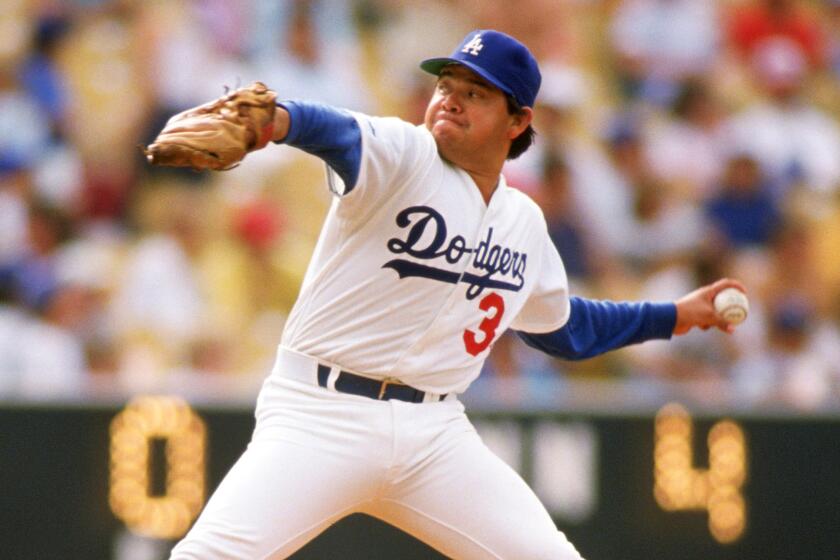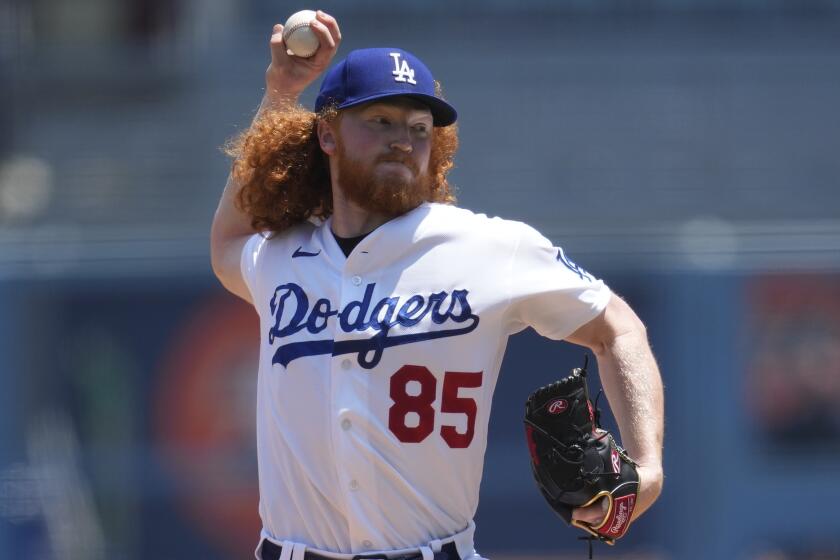
Robert Vargas had barely wrapped up his first day of work on a Boyle Heights mural honoring Fernando Valenzuela on Tuesday night when he heard the news that the beloved Dodgers pitcher had died at age 63.
“I still had my harness on,” Vargas said early Wednesday. “I wasn’t very far away [from the mural site]. I was having dinner after leaving there, so I returned to the wall just to feel connected to the space that I’ve already developed the relationship with as I’m about to paint this.
“Now it takes on even a greater meaning. It’s still a celebration of a remarkable life, but it also now becomes an altar.”
The Los Angeles-based artist found that out immediately upon returning to his work site at an apartment building a block west of Mariachi Plaza.
“There were news crews already there,” he said. “ And there were even friends who came by with marigolds, which are the flowers for the Day of the Dead altars.”
For one magnificent season, a Mexican immigrant electrified a city that had long treated its Mexican population as little better than the help, winning the Cy Young and Rookie of the Year while helping to propel the Blue Crew to their first World Series win in 16 years.
Valenzuela came from a small town in Mexico and became an MLB sensation with the Dodgers in 1981, when he sparked the cultural phenomenon known as “Fernandomania” and helped L.A. defeat the New York Yankees in the World Series.
“I was a kid when all of this was happening and I just know that he is someone that is inspiring to not only the Latin culture, but many cultures,” said Vargas, whose mural is titled, “Fernando Mania Forever.” “He’s just an inspiring figure that did some amazing things no matter where he came from.”

A member of the Dodgers broadcast team since 2003, Valenzuela was absent from the Spanish-language broadcasts near the end of the regular season. On Oct. 2, the Dodgers announced that Valenzuela had “stepped away from the Dodger broadcast booth for the remainder of this year to focus on his health.”
In a video filmed Tuesday night at the future mural site and later posted on his Instagram stories, an emotional Vargas struggled to come up with words to express how he felt about the passing of such a significant figure for himself and so many others.
“I really was hoping that he would come out of his situation,” Vargas told The Times on Wednesday. “I was really anticipating possibly him seeing [the mural]. I just feel like a part of my childhood is gone.”
Fernando Valenzuela was more than just a Dodgers pitcher. He was a friendly soul who forged a strong connection between a city and its baseball team.
He added: “I’m just putting all the emotion into that wall.”
Vargas said he conceived of the idea of a Valenzuela mural in Boyle Heights earlier this year while painting a mural of current Dodgers superstar Shohei Ohtani on the side of the Miyako Hotel in Little Tokyo. Located just a little more than a mile from each other, the two murals are connected by the 1st Street bridge, as well as the stories of the players and the communities they represent.

“It’s my way of promoting and advocating for unity and representation where these communities can see heroes that look like them,” Vargas said. “At the same time under the umbrella of the Dodgers, the whole city can get behind this, because it’s all about advancing the collective forward, which is really oneness.”
The Ohtani mural is larger than life, to say the least, and Vargas has similar plans for his Valenzuela tribute. The wall has three panels, so Vargas will paint three separate images of Valenzuela pitching for an overall mural he estimates will be more than 50 feet tall and 70 feet wide.
“So now the 1st Street bridge is metaphorically the unity bridge because these two murals bookend each other and face each other,” Vargas said. “If you are on the 1st Street bridge and you are looking in both directions, you can see both murals.”
The unveiling will be Nov. 1, a date Vargas originally chose because it is Valenzuela’s birthday and it falls on Día de Muertos. It also just so happens that if Game 6 of the Dodgers-Yankees World Series is necessary, it will take place at Dodger Stadium that evening.
Fernando Valenzuela, the Mexican-born pitcher who led the Dodgers to a World Series win and vastly expanded MLB’s Latino fan base, dies at age 63.
That doesn’t leave Vargas much time to complete the piece, especially considering he’s doing all the painting.
“I’m painting it completely freehand,” said Vargas, who plans to work from 8 a.m. to 5 p.m. every day until it’s done. “My process is no grids, no projections, all with a brush, so it’s completely free form. But when you’re painting with passion and intention for the greater good and to represent the community here, it’s like a stream of consciousness.”
Early Wednesday, Vargas said he hoped to have almost a third of the mural done by the end of the day, stating that Valenzuela’s death only “amplifies its importance.”
“I’m seeing it through in a way that is healing now — not only for myself, but I actually believe for the city to have this image up,” Vargas said.
Who was Dodgers legend Fernando Valenzuela? The man Dylan Hernández got to know in the press box for years knew baseball and understood his value.
Vargas is inviting the public to come to the site Wednesday after 1 p.m. to help construct marigolds out of fabric and make the mural “the largest ofrenda ever.”
“I’m going to have these symbolic marigolds all the way around the building on the surface of the wall, like you would see in an altarpiece for the Day of the Dead,” Vargas said. “And that will frame the wall or the surface while I paint the inside of that with the original design idea. It will be something that eventually will be removed. People can come and help construct them. I think that will be also a form of healing for people.”
More to Read
Are you a true-blue fan?
Get our Dodgers Dugout newsletter for insights, news and much more.
You may occasionally receive promotional content from the Los Angeles Times.















